#but neither is Ridley Scott
Text
14/?? Gnosis, and lack thereof
(Previous) | (Index) | (Next)
⛬
We return to the movie that could’ve been a contender, Prometheus. In this episode, a two-year-old poisons a man.
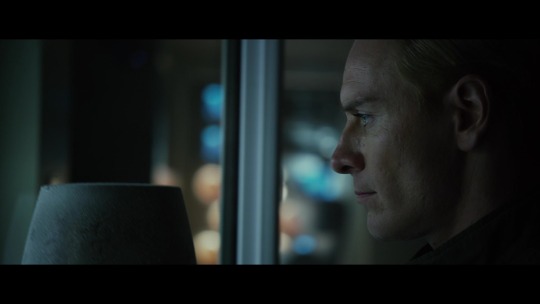
I’m not alone in thinking David is the most well-realized character in this movie. Michael Fassbender was given the most space to act through expression and reaction to others and his environment, which helps create an android character that has much more inner life than his human castmates. He also gets what I’d call the Data bonus: android characters can more easily get away with screamingly clunky exposition or explicitly stating the meaning of a scene. You can give them absolute gibberish if you want to, and it sounds perfectly logical when they say it.
youtube
[Video description: A small selection of technobabble from Star Trek: The Next Generation, mostly featuring Data.]
David is also the easiest to be sympathetic to, because people keep being assholes to him.

Yes, David has received mysterious orders from a mysterious man who’s still in stasis. It’s Peter Weyland. It’s obviously Peter Weyland, this is why David has the dream-reading helmet thing that felt so out of place at the start of the movie. This is also why Guy Pierce, a 45-year-old, was hired to play an infinity-year-old man. Weyland was going to appear as his ideal self in one of these dream sequences, but it was cut from the movie. So instead, we just have Vickers demanding to know what “he” wants, and the answer is “Try harder”.
Peter Weyland, beginning a trend for the company bearing his name, has an obsession with this alien stuff. …This trend was actually begun by Charles Bishop Weyland in a completely different continuity that also featured ancient alien contact with Earth, but hey, details. This Weyland wants results, damn it, and David gets an excuse to kill one of the crew.
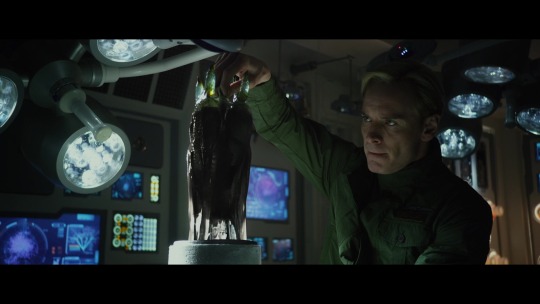
Although it’s not quite that simple. The movie indicates that David can’t go against orders from the company, especially from Weyland. He has to “try harder”, and he’s brought back one of those alien urns that apparently nobody cares to examine but him.
It’s got a goth lava lamp in it.
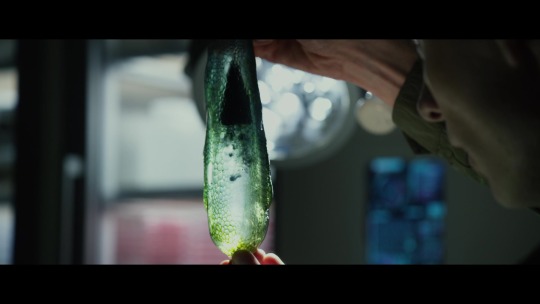

While we don’t get much indication David knows why this stuff is dangerous to organic life, I’ll give the movie a very tiny pass: it’s implied that David has figured out how to read the Engineer’s cuneiform script. He decants a droplet of Menacing Black Goo onto his (Weyland-branded) fingertip, and sets off to find a test subject.
Thank god, he chooses Holloway.

I don’t like not liking characters. I don’t generally anticipate seeing someone’s comeuppance, but this movie gets me damn close to that feeling. In the movie’s partial defense, some of this was probably intended. Mainstream American fiction sets a high bar for what a bigot looks like, and Holloway’s been clearing that. I’m less certain the movie knows everyone’s behaving like a bigot, but we’ll get to that eventually. But Holloway? Definitely.

This creates a fairly interesting scene. One that even reaches towards good. David has the means to kill Holloway. The audience knows this. And we get to watch when he makes the decision to commit to it, and why. And, blessedly, it actually ties into an intentional theme of this movie.
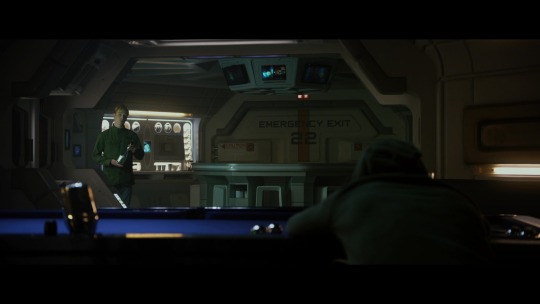
Holloway’s still drunk and miserable–he’d previously muttered that the alien structure on the planet was “just another tomb.”
I, speaking hyperbolically, would consider that grounds enough to off him. He’s an archaeologist who can be sent into a drinking binge by finding a thing made by dead people. An archaeologist. That in itself is such a ridiculous indicator of how unfit this character is for his role.
But no, he wanted to meet his maker, “To get answers.” Sure, lots of people have existential questions they feel are important to them. That is understandable. Even clueless assholes can wonder about that. But it takes an especially hubristic asshole to decide they’re the one worthy of asking someone who might have the answer.
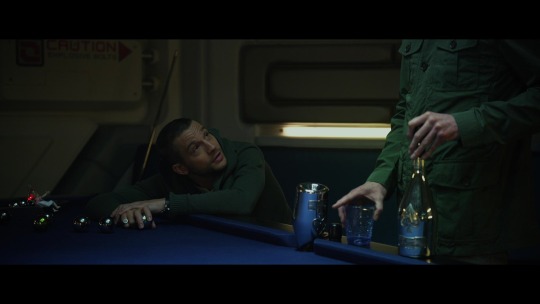
Did anybody notice they didn’t bring any diplomats or orators on this trip? They didn’t bring any cultural exchange gifts with them when they approached the alien structure? They weren’t treating the Engineers as people, just something to discover.
David, someone else they’re not treating like people, asks Holloway “Why do you think your people made me?”, and the answer he gets is “Because we could.” David is quietly but openly disappointed in that.

This is the whiplash of this movie. We have the biggest bunch of shambolic assholes klutzing around, waiting to get killed off by the plot, and then we have David expressing the horror of Valentinian gnosticism.
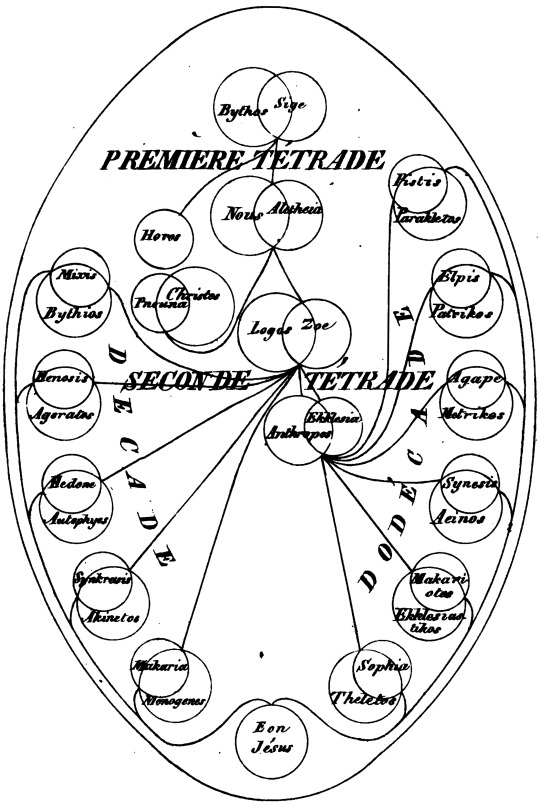
In brief, because even the wikipedia page says “The theology [...] is extremely complicated and difficult to follow”, the strain of Christian gnosticism expressed by the 2nd century theologian Valentinus believes that the world was created by an ignorant being. They believed there was a benevolent god out there which was/produced Jesus, but the “demiurge” (lit. “craftsman”) who created the world was not this deity. The demiurge was an imperfect, lesser being, that believed itself to be the supreme god of the universe. In Valentinianism, as with other gnostic schools, to be born into the world was to be trapped within a creation of a creature that was prone to fits of abusive behavior.
Gnostic christianity was, at the time, an attempt to square a number of contradictory ideas: the incredibly influential ideas of Plato on the formation of the universe, the growing theology of the new Christian movement, and the examples of divine wrath and jealousy in Jewish scripture, that were hard to square with what early Christians saw as a less violent deity they wanted to worship. There were probably also some anti-Jewish Egyptian myths thrown in as well, depicting their god as a donkey-headed incarnation of the malevolent deity Set. Some may recognize that particular slander from its deployment against early Christians, including our first-ever depiction of Jesus’ crucifixion: a rude bit of graffiti.

In our time, there’s only one remaining gnostic (non-christian) religion with direct continuity to the period, the Mandaeans. Christian gnosticism was deemed heretical, when one of the many different gospels circulating at the time was selected as orthodox in the 4th century, along with an attendant theology. But it remains a fertile ground for philosophers, fiction-writers, and every once in a while someone reinvents bits of it when they hit upon contradictions in christian thought.

The latter seems to be the case with Ridley Scott. He’s sometimes described as an atheist, but his actual statements on the matter show he’s either casually gnostic or a deist, very much influenced by christian doctrine:
“If we looked at the whole thing practically speaking, the Big Bang occurred and then we go through this evolution of millions, billions of years where, by coincidence, all the right biological accidents came out the right way. To an extent, that doesn't make sense unless there was a controlling decider or mediator in all of that. So who was that? Or what was that? Are we one big grand experiment in the basic overall blink of the universe, or the galaxy? In which case, who is behind it?”
https://www.bbc.co.uk/films/callingtheshots/ridley_scott.shtml
Tangent: that question came right after he’s quoted as saying “I think there's no originality [in modern films]. I think everyone is stealing from everyone else and going back to the originals. I usually go in for 20 minutes and then get up and leave.” This interview was back in 2006. The next year he’d direct American Gangster (loosely based on a biography), then Body of Lies (Roger Ebert called it "a James Bond plot"), then Robin Hood (it’s Robin Hood), then Prometheus, the movie I only watched because it seemed to be in dialog with a film he directed in 1979. Buddy, if that was your problem, you were part of the problem.
But anyway. We have a director who had stated interest in a christian-influenced cosmogony: he seems to state a belief that we exist because we are supposed to exist, rather than being a random event. This is a movie where he does seem to be trying to do something with that. He is beginning with that premise, and using Alien as the shared language to express it. He doesn’t know why we exist, but he can imagine why we would make someone exist.
Placing that in amongst these characters is bleak to the point of puerility, frankly. Why would we create a being like us? Well, this one asshole doesn’t know.
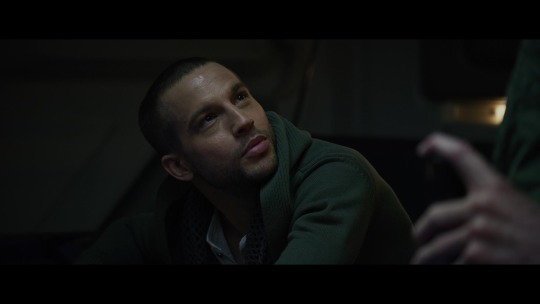
David, at this point in Prometheus, has already determined that humans are fallible creators. Hell, he’s decided the Engineers were also failable. He, y’know, witnessed how gooey one of their corpses was. But he’s yet to decide on whether humans are just ignorant, trying and failing to be good–as per Valentinus–or if they’re actively malevolent.

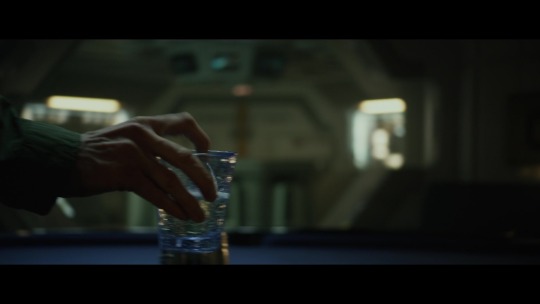
The fact that David doesn’t poison Holloway’s drink until just before handing it over does neatly show that he was quietly given a chance to answer that question. Holloway continues to be a jackass and, when asked what he’d do to answer the existential question he wanted to pose to the Engineers, he says he’d do “anything and everything”.
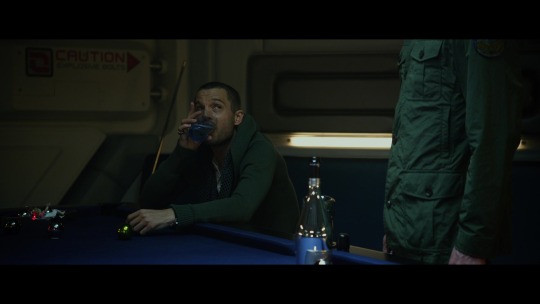
The movie eventually treats Peter Weyland as especially deluded in his self-serving quest to get the Engineers to answer his more selfish questions, but I don’t think his ego was unique in this movie.
On our journey into the movie this time, Prometheus has attempted to grapple with subjects its script hasn’t earned. Next time, it incorporates imagery it hasn’t earned. It’s worse than this scene, but in a far more subtle way.
If you want a neat look on european and middle eastern mysticism from an academic standpoint, Esoterica is a pretty damn good channel, put together by a self-described “dialectical materialist in the tradition of Structural Marxism”. I’ll happily take recommendations on other academic sources aimed at the general audience.
https://youtu.be/7EwRD6SzXws
https://st-takla.org/Feastes-&-Special-Events/Coptic-Nativity-of-Jesus-Christ-Milad-El-Masih/Coptic-Jesus-Incarnation-Christmas-03-Incarnation-of-the-Word-Book.html
https://en.wikipedia.org/wiki/Masbuta
https://en.wikipedia.org/wiki/Drabsha
https://www.deviantart.com/pretty--kittie/art/Prometheus-Engineer-407322241
https://en.wikipedia.org/wiki/Archon_(Gnosticism)
https://en.wikipedia.org/wiki/Sethianism
⛬
(Previous) | (Index) | (Next)
⛬
#Prometheus 2012#Prometheus (2012)#I've been threatening to go on a ramble about gnostic philosophy since the start of this movie#it's finally happened#I'm not a scholar of this stuff#but neither is Ridley Scott
46 notes
·
View notes
Text
Body Horror Beatdown, Match 4, Round 2
Vote for your favorite:

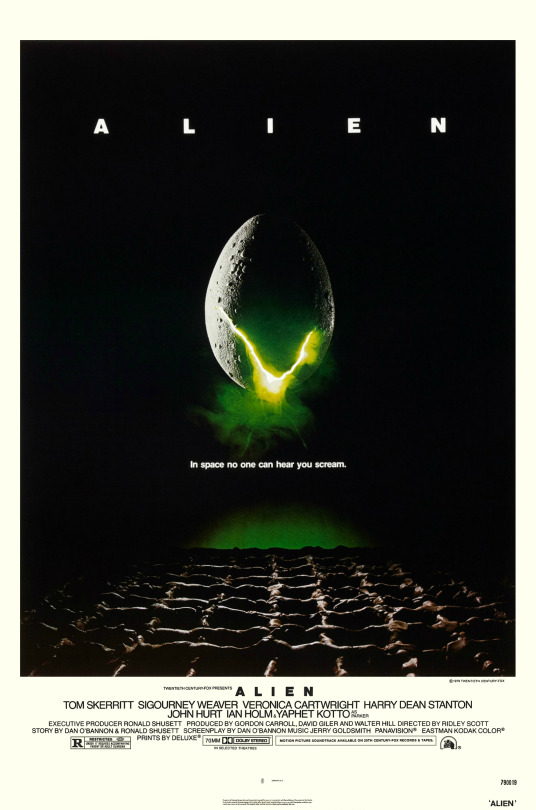
Propaganda under the cut.
The Fly:
Be afraid. Be very afraid.
"Main character turns into a man-fly hybrid slowly over the course of the movie. What happens to him is truly horrific and only adds to my disgust of insects as a whole. Some might even say the ability to make Jeff Goldblum disgusting is a body horror feat in and of itself."
Alien:
In space, no one can hear you scream.
"Okay so, for starters it’s famous for one of the scariest body horror scenes in the history of film (also one of the earliest REALLY SCARY REALLY GORY ONES) where you see the xenomorph pop out of the guy’s chest, from then on things just get worse even if it’s a slower kind of dread, you get to see the alien in all of its glory and witness the murders of the crew members in sometimes gruesome sometimes off-screen up-to-the-imagination types of ways. I guess the freakiest part though is the idea that you can be inhabited by one of those creatures and there’s nothing you can do to stop it from literally tearing you apart from the inside out, unless you die"
#bodyhorrorbeatdown#body horror beatdown#gore#body horror#round 2#polls#the fly#the fly 1986#alien#alien 1979#david cronenberg#ridley scott
136 notes
·
View notes
Text

Presenting... Horatio Nelson! (I did the best that I could with the CC avaliable.)
Inspired by @vermutandherring's amazing post here & the latest "biopic" based on Napoleon Bonaparte; but also I am a cheeky bitch and have just had Old Nel on the brain lately. I can guarantee you I put more effort into sculpting his facial features than Ridley Scott did in historical research, but that's neither here nor there. I spent TWO HOURS trying to find the right hair, caved, and settled on this one.
Uniform by @historicalsimslife, medals by @melonsloth, hat by @revolution-sims
Taken in-game with Reshade 5.6 and some fancy-ass shaders, then made into a portrait with Photoshop.
#historical sims 4#napoleonic era sims 4#regency sims 4#georgian sims 4#18th century sims 4#19th century sims 4
63 notes
·
View notes
Text
I’m just a defense analyst, so I’ll leave a proper critique of Ridley Scott’s new blockbuster biopic Napoleon to the many reviewers who have already disparaged it. I, for one, found it to be a lukewarm mélange of battle scenes and romantic vignettes, leaving me with neither a sense of the man Napoleon Bonaparte—the bicorne-hatted soldier-turned-emperor of the French—nor a feel for the age of upheaval he so much defined. For a grand piece of historical fiction from the director of such masterpieces as Blade Runner, Thelma & Louise, and Black Hawk Down, the film curiously fails to entertain.
My perspective on Napoleon is a different one. Scott’s film stands in a long line of movies, novels, and even history books that have given the world an entirely wrong view of how wars are fought—and even more importantly, how they are won. And that matters, because the mythical idea of war embedded in Napoleon and so many other works has become so widespread in our culture and discourse that it ends up informing actual decisions about actual wars.
Let’s call it the decisive battle myth. Napoleon, with its focus on famous battles such as those of Austerlitz and Waterloo, perpetuates the dangerous idea that wars are decided by great and bloody clashes. This obsession is as old as there have been written accounts of history, but in popular culture in the English-speaking world, the myth can be traced back to the 1851 publication of The Fifteen Decisive Battles of the World: From Marathon to Waterloo, which helped kickstart an entire genre of works focusing on battles supposed to have singlehandedly changed the course of history. In film, think of The Longest Day, Midway, and Stalingrad; in books, the list of battle histories and battle fiction is too long to contemplate. The genre even plays in counterfactuals: The 1993 movie Gettysburg, based on Michael Shaara’s novel The Killer Angels, suggests that the South could have won the U.S. Civil War had the Battle of Gettysburg gone the other way.
No matter what these works have taught us to think, the decisive battle is a myth. Wars between major powers are not decided by great battles but by attrition of soldiers and materiel, which in turn is determined by such things as force size, logistics, production, and technology. Battles, large and small, are important only to the extent to which they accelerate attrition and wear down the other side. Yet the myth of the decisive battle—the idea that an adversary can be defeated in one big and bloody but short engagement—remains powerful. It’s also dangerous, because it affects not only ordinary moviegoers but military and political leaders as well. In other words, the very people deciding whether to start and how to fight a war.
Scott’s focus on battles is hardly surprising. Napoleon fought numerous campaigns culminating in big set-piece battles, after which the defeated side sought peace; at the Battle of Austerlitz, Napoleon defeated the allied armies of Austria and Russia, forcing the former to sue for peace and the latter to retreat home. But the French emperor’s most celebrated victory—exactly 218 years ago today—was only an episode in a long war that did not end until 10 years later, after attrition and mutual exhaustion.
The focus on decisive battles orchestrated by a brilliant military leader such as Napoleon has been poisoning Western military thinking for centuries by suggesting that great power wars can be short affairs. The idea that an adversary can be decisively beaten in just one or a few engagements has incentivized political and military gambling: Think of the German Schlieffen Plan that bet on a single, decisive encirclement of French forces and their quick annihilation or capitulation in 1914, with the disastrous result of condemning much of Europe to four years of attrition with millions of soldiers killed. The idea of a quick, decisive battle inspired then-Iraqi leader Saddam Hussein to invade Iran in 1980, which led to a horrifically bloody eight years of attrition.
More recently, Russian President Vladimir Putin thought one decisive push toward Kyiv in early 2022 would quickly and painlessly conquer Ukraine. Hundreds of thousands of deaths later, the grinding war goes on. For all the emphasis on Napoleon’s quick campaigns and decisive battles, his wars tell a similar story of long and painful attrition: More than 5 million European soldiers were killed or otherwise died during the Napoleonic wars, a level of carnage, relative to total population, on par with World War I. France alone lost around 860,000 soldiers, including 38 percent of all men born between 1790 and 1795.
That Napoleon is only a movie doesn’t make it better. There are documented cases of films influencing a policymaker’s decisions to go to war. In 1970, for example, then-U.S. President Richard Nixon repeatedly watched the film Patton during the decision-making process to expand the Vietnam War into Cambodia, taking inspiration from the movie general’s willpower and single-minded belief in U.S. military power. One academic study found that popular culture, including fictional films, can frame the way we think about a multitude of issues, and there is no reason to believe that military officers and policymakers are exempt from these effects. Movies can help prevent wars, too. Former U.S. President Ronald Reagan was inspired by the television film The Day After and Tom Clancy’s novel Red Storm Rising to push for nuclear arms control. But if decision-makers and military leaders are prone to fighting the wars of their imagination, then a popular culture that reinforces the idea that wars can be short and decisive may incentivize willingness to look for a quick military solution to a political problem.
There is much more in Napoleon that made me cringe as a military analyst. What you see on the screen has absolutely nothing to do with warfare in the age of Napoleon—as a matter of fact, the clouds of gunpowder from the era’s muzzle-loaded muskets meant you would not be able to see very much on a Napoleonic battlefield to begin with. The battle scenes are a Hollywood mishmash of medieval melees, meaningless cannonades, and World War I-style infantry advances.
One scene that stands out is the apocryphal depiction of Napoleon leading a cavalry charge into what are supposed to be the Russian lines at the Battle of Borodino. As a former artillery officer, of course, Napoleon never led a cavalry charge in his life. For all of Scott’s fixation on Napoleon’s battles, he seems curiously disinterested in how the real Napoleon fought them—and just as disinterested in the changing character of Napoleonic warfare. By 1812, Napoleon’s enemies had not only learned to adapt by emulating the French style of fighting, but the battles themselves had turned into meat grinders of such a scale that no individual could control them. The battles of Wagram (in 1809), Borodino (1812), and Leipzig (1813) each involved hundreds of thousands of troops and many hundreds of cannons. The idea that the commander of his country’s armies in an 1812 battle had the liberty to lead a horse charge is so preposterous that the scene makes Mel Gibson’s Braveheart—considered one of the most historically inaccurate films in recent decades—look like a paragon of historical realism.
Napoleon’s military genius was not just about individual heroism or skilled battle tactics, but more importantly his vision for structural reforms. Napoleon helped institutionalize the corps system, dividing up large armies into smaller ones as a way to enable more effective command and control, as well as greater speed and range. Key to this new corps system were Napoleon’s marshals, distinguished military officers who sometimes remained undefeated in battle and whose deaths Napoleon mourned deeply. It was the marshals and other officers to whom Napoleon delegated authority; they proved to be a major asset contributing to his victories. In the film, these colorful independent actors are relegated to the role of footmen.
The film’s wild inventions go much farther. The British Army, led by the Duke of Wellington, features prominently, even though it played only a minor role in battle. Rather than the fighting role, the British contribution to Napoleon’s defeat lay in the sea blockade and in financing the huge standing armies of Austria, Prussia, and Russia that bore the brunt of the fighting. The duke and Napoleon never met in person, another invention of the movie that could have been omitted without loss, since it is devoid of meaningful dialogue that might have helped the audience better understand Napoleon’s volatile and ruthless character. Scott could instead have depicted the heated argument between Napoleon and Austrian diplomat Prince Klemens von Metternich during their famous eight-hour encounter in Dresden, then the capital of the Kingdom of Saxony, in 1813. The meeting convinced Metternich of the French emperor’s troubling mental state and the impossibility of making peace as long as he reigned.
There is no reason to believe that the myth of the decisive battle will lose its power any time soon. As the historian Cathal J. Nolan writes in The Allure of Battle: “The idea of decisive battle will always be more alluring than winning by attrition—morally and aesthetically; to generals and theorists, and to publics hungry for war news.” Nolan might have added film directors to his list.
Let us hope that U.S. and NATO military strategists and force planners do not draw too deep an inspiration from Scott’s depiction of Napoleonic battle. It’s bad enough that the allure of the decisive battle is already shaping U.S. deliberations over how to fight a possible future war with China over Taiwan. Disregarding the likely attritional character and extended length of such a fight—and the requirements in manpower, weapons, ammunition, production capacity, and political constancy that would entail—could spell disaster for the United States and its allies. Focusing on long attrition instead of dramatic clashes would certainly make for a boring film experience, especially since one only has to look at Ukraine to see the long slog of attrition playing out in real life. Nonetheless, stripping Napoleon of the romanticism associated with epic battles decided by the archetypal hero on horseback would be a small first step in gaining a better understanding not only of past wars, but also of how future wars will be fought.
29 notes
·
View notes
Text
i know that no one on this website watched the ridley scott napoleon movie (and neither did i) but i do feel like it’s a shame that no one knows about “you think you’re so great because you have BOATS!”
3 notes
·
View notes
Text
I'm halfway through rewatching Ridley Scott's 2010 Robin Hood (I watched it when it premiered and watched it only once again in the past 12 years) and I am bewildered at the creative choices taken.
Its worst crime, and most baffling, is that it seems to not really know what it wants to be. Yes, I get the idea was to make a "realistic" take on Robin Hood, but in the end, it ends up neither being a child's adventure story (as the tale originally is) nor a complex political war drama (that for some reasons has prophecies, if I recall correctly... I don't know, I was getting frustrated and haven't even reached the midpoint...).
For who was this made? Children and young adults will get bored by all the weird Plantagenet drama thrown in the midst of their outlaw justice warrior adventure. And history lovers will be annoyed by having silly Robin Hood shit meddling in their highly inaccurate Plantagenet political plotting...
So both parts are bad (the adventure part isn't very entertaining, and the history/political part isn't very accurate ). Everyone loses.
As for the costumes... they make me sad. There are some costumes that show a lot of care and love for the craft... and then there are a few too many standard princess cosplays lying around. Again, it can't decide what it wants to be...
That's my first hot-take of the year. A hot-take on a 12-year-old movie. That's me. Welcome to the costume vault.
#hot take#robin hood#2010 robin hood#ridley scott#russell crowe#we need more plantagenet drama#that family deserves its own soap opera
23 notes
·
View notes
Text
I’m not dead and neither is this page :)
I will be back soon. In the meantime, the Napoleon movie is churning along. I found this blog with a commentary from a viewer:
“It’s 150 minutes. Covers the sweep of Napoleon's life from his promotion around the time of the revolution, to the end. I think it’s bigger, better and MORE PSYCHOLOGICAL than Scott’s epics like Kingdom of Heaven and Gladiator. Also more political. I think the picture is a masterpiece, or very nearly one. It's the culmination of Ridley's life's work as a filmmaker. His staging of battle scenes on a near-cosmic scale is mind-blowing. Joaquin gives a Brando-like performance, taking some very big risks, and at times verging on the absurd, but always taking the audience with him. As a movie about a nationalist in a time of chaos and disintegration who thinks in terms of pure power, it has a lot of parallels to 2022. It's a great movie and I'll be surprised if there is anything better released in 2023.”
Well….sounds promising. I guess we can always hope?
30 notes
·
View notes
Text
By obsessing over the foibles of men far greater than any contemporary person in both word and deed, we lose sight of why we revere them in the first place.
It is with this in mind that I say with great disappointment that Ridley Scott’s “Napoleon” is terrible.
3 notes
·
View notes
Text
What is Gene Roddenberry's vision?
And just how much should we care about adherence to it? In which I try to surface the values and setting assumptions that underpin Star Trek as conceived of by Gene. This part of my series of essays examining the question of Whether Star Trek Picard portrays the Federation as a dystopia?
Alright we need to face this head on. We have a bit of a problem with uncritical adoration of auteurs. Usually men. The science fiction and fantasy space is dominated by men who get raised up on pillars for having a distinctive vision. Gene Roddenberry, George Lucas, Frank Herbert, Ridley Scott, James Cameron, Stan Lee, Joss Whedon - the list goes on. We all know there’s a bunch of women whose work was either ignored or should be reevaluated who should go into the pantheon of awesome women genre writers like Ursula K LeGuinn, Octavia Butler and Mary Shelley. That’s not really what this essay is about but we do need to be mindful of this aspect of “the Gene Roddenberry problem.”
It's probably not surprising given this blog’s premise of Loving Critique / Critical Adoration, that I’m neither fully onboard with “Death of the Author” approaches to consuming media nor am I totally against it. If you per chance have a setting whose author you have chosen to ignore because their opinions and real world conduct are intrusive and seem dissonant with the moral clarity you see in the work, you do you.
On the flip side, I think there is much that can be rewarding in trying to suss out an author's intentions and analyze media against those intentions. What I find troubling is weaponizing authors to win silly arguments.
Gene’s vision is sometimes used synonymous with concepts like “canon” to assail “NuTrek.” Sometimes it's even used to reject everything from roughly season three of The Next Generation onward. The premise being that the further one is removed from Gene Roddenberry being directly involved, the more it no longer reflects and respects his aesthetics and worldview. This is also intimately wedded to the desire to treat Star Trek as a history of the future.
What is “Gene’s vision?” That’s a complicated and much debated concept that everyone seems to think they know what it is and thus can wield it to smash the arguments of their opponents. As I think respect for Gene’s vision does not require fanatical adherence to it in every detail, I am prepared to offer some nuanced interpretations of it, including some interpretations wherein I think Roddenberry may have been a bit naive. I am also approaching this from a standpoint of believing that Roddenberry was fundamentally a good faith actor and that Star Trek represents an attempt to apply his sense of justice, how people should order their lives and societies, and his sense of what the future holds.
Like reasonable people, Gene’s opinions on specific matters likely changed often while his core values would have changed slowly if at all. Therefore one might expect that details of how people relate to one another and how the setting is constructed would have changed quite dramatically in some ways between the firmly Cold War situated TOS and The Next Generation which arrived at the tail end of the 1980s at a time when a more triumphalist / end of history mindset was beginning to take shape. However, the core values and themes of the two series ought not to have changed dramatically.
What are those core themes?
In my estimation they can distilled down to:
A preference for nonviolence that is strongly opposed to militarism but stops short of pacifism. Star Trek generally seems to put forward the idea that violence should be a last resort but some things are worth fighting for and not all fights can be avoided.
A belief that most individuals are rational actors and reason prevails when a shared interest in an outcome (usually the prevention of war or mitigation of harm) can be focused on.
Anti-Colonialism/Anti-Imperialism. More powerful civilizations do not necessarily have the wisdom to intervene responsibly in the affairs of less powerful civilizations. i.e. the Prime Directive.
Meaningful, lasting, and positive social change is unlikely to be imposed from outside a society. (Prime Directive again)
The avoidance of apocalyptic conflict may require finding a way to co-exist alongside mutually antagonistic cultures and political structures. Some degree of cultural relativism may be necessary to avoid catastrophe.
If apocalyptic conflict can be averted long enough, peace may be maintained less through threat of mutual annihilation and more from a recognition of shared vital interests and the maintenance of a habit of peace.
It might get worse before it gets better. Gene was no accelerationist, but he did seem a bit of a pessimist in believing that a united and peaceful Earth depicted in Star Trek would only come about after a series of ruinous conflicts.
Anti-Techno-Utopianism. The idea that technology rather than social progress will “solve all our problems” is often erroneously read into Star Trek as a core theme. Star Trek more often than not features stories about having to master the ethical considerations around advanced technology rather than advanced technology being a singular good with no downsides.
Opposition to transhumanism. Gene seemed to believe that the creation of human beings with “superior strength and superior intellect” would breed “superior ambition” and contempt for lesser humans. Socialist and Anarchist thinkers might be inclined to see this as a metaphor for concentrated wealth and power.
Anti-materialism. I hesitate to call Roddenberry anti-capitalist for a couple of reasons. I find label wars to be tedious and more likely than not to reflect the desire of the labeler to claim the individual to be labeled as a fellow traveler so as to assimilate their social cred or the labeler wants to put the labeled into the “bad people” box and in doing so, condemn all people who express sympathy for the labeled or are intrigued by their work. Still, most protagonists view using abundance as a way to measure status as silly and the Ferengi are an undeniable caricature of the evils of greed.
Sex positivity. Captain Kirk gets mocked a lot for his libido and there are a lot of great deconstructions of why Captain Kirk, the oversexed pop culture icon, doesn’t actually line up well with the way the character was actually depicted. However, there’s also just not a lot of stigma attached to having a rich sex life.
An optimistic tone. Good usually wins, bad usually loses. People generally don’t act “gloomy.” Characters are in control of their behavior and rarely act impulsively or erratically without undue influence.
I could go on, but I think these are probably the most crucial for analyzing Star Trek Picard and its adherence to “Gene’s vision.” This should be sufficient as a roadmap for how I am processing my rewatch of Star Trek Picard and also how I'm thinking about season three as it unfolds.
9 notes
·
View notes
Text
Movie Fun with Team Sherwood: The Robin Hood Film Duets
I'm impatient, so I just pushed "go" on my holiday weekend sales. That means my TTRPG Sherwood is $5.25 on Itch and DriveThru. So are My Chivalric Bromance and both versions of Dragonmaw Cave (all also on Itch where I'll get a bigger cut of the proceeds).
It also means I'm gonna talk about Robin Hood movies. Why? To celebrate! Also, on Tumblr, you can't mute me!
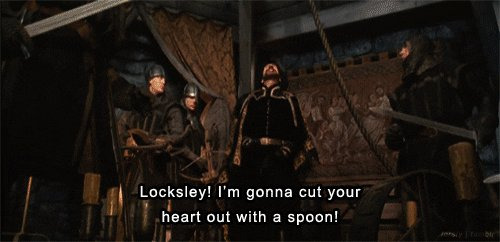
Before 1991, I'm pretty sure it was really rare to have a big Robin Hood cinematic release accompanied by separate TV movies, direct-to-video, and direct-to-streaming titles. Since then, it's become the new normal, with most big-screen Robin movies accompanied by a lower-budget limited release.
I'm trying to avoid spoilers below, but I make no promises since the story is old. If you're worried about them, you may want to avoid this.
1991
In 1991, we got a major cinematic release with a big name cast that was one of the highest grossing films in the US that year.
Then we got a good UK movie starring Uma Thurman and Patrick Bergin.
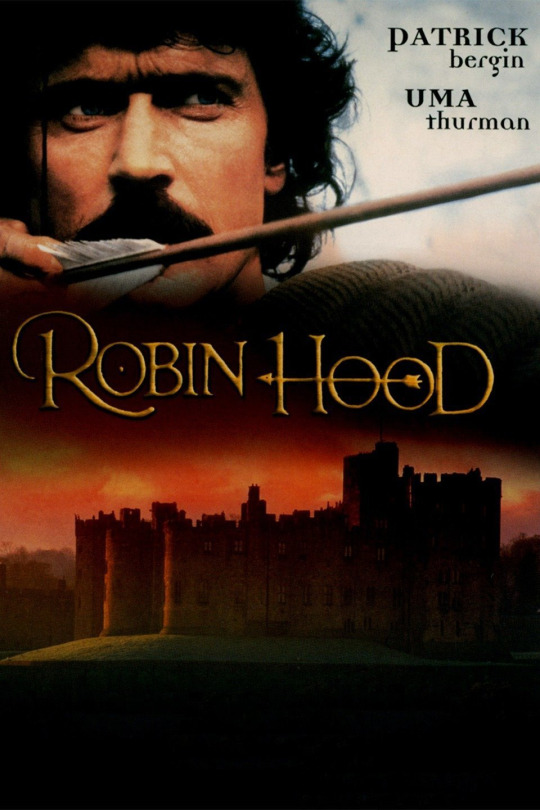
The UK's 1991 Robin Hood starts off in a gloomy, foggy, rainy England where Robert Hode offends a visiting dignitary (Jürgen Prochnow) here to marry to local Sheriff's niece (Uma Thurman's Marian), refusing to allow him to execute a poacher. Things progress, and as they do we go from a gloomy quasi-realism to a Midsummer Night's Dream surrealism. It's a strange transition, but it sure as fuck isn't a boring one. By the time the outlaws get into the Sheriff's castle disguised as Feast of Fools revelers (with Jeff Nuttall as Friar Tuck), it's unsurprising to hear the impious friar greeting the outlaws' defeated foes with "Welcome to Hell!"
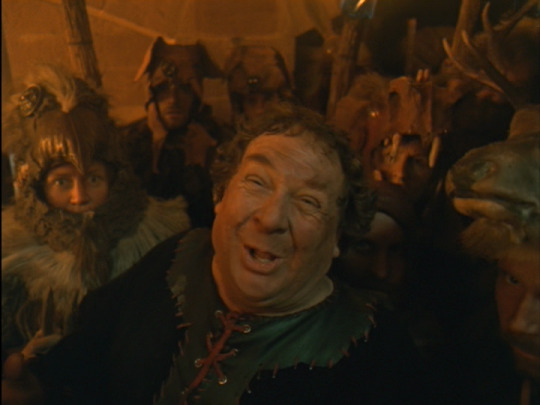
Over in the US, the script and Costner's palpable disinterest in the film (and the role, his costars, the audience, etc.) were the twin black holes that no capable actor's efforts could escape. Well, almost because Alan Rickman (the Sheriff) and Geraldine McEwan (Mortianna) were both incredible—though both avoided sharing screen time with Costner—and Rickman improvised the only good lines in the film on his own.
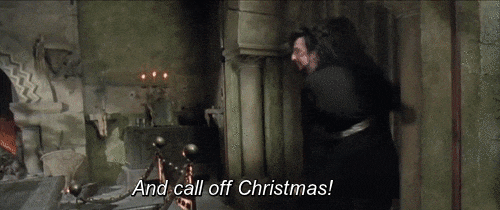
2009-2010
No this isn't the same year. I know that, but I'm the person writing this, and I'm making up all of my own rules as I go.
One of the favorite complaints of film reviewers is that a movie "has nothing to do with the Robin Hood tradition." That's almost never true in any coherent sense of "the tradition." But then this set of movies happened:
In 2009, Robin Dunn lead Beyond Sherwood Forest, a SyFy made-for-cable film about Robin Hood finding a magical portal, talking to fey, and meeting a dragon.
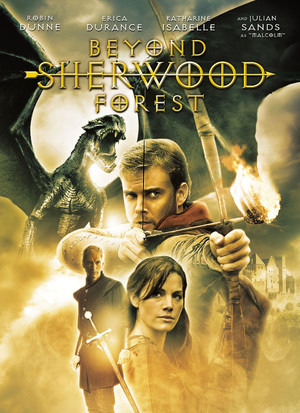
In 2010, Ridley Scott released a Russel Crowe lead film that had jack shit nothing to do with the Robin Hood tradition.
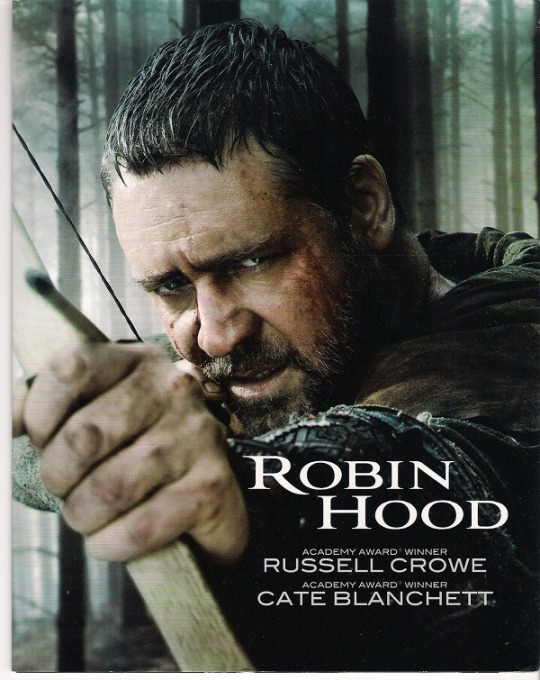
Okay, technically, there are other Robin Hood films that feature the Magna Carta, but this was the first one that had Ridley Scott, Cate Blanchett, and a budget. But all they could afford was a weird Magna Carta conspiracy theory.
2018
By now, you're probably thinking that I just look at 2 Robin Hood films and just pick the one with the lower budget as the good one. But we've not gotten to 2018 yet. Two films came out this year: Robin Hood and Robin Hood: The Rebellion.
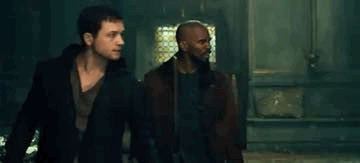
Neither was good, but there's a certain weird charm to Taron Egerton's portrayal (and Jamie Foxx's Little John was one of the more exciting revisions to that character's story I've seen in a long time). Egerton's probably one of the more charismatic actors to take on the role (next to Disney's red-n-furry guy, of course).
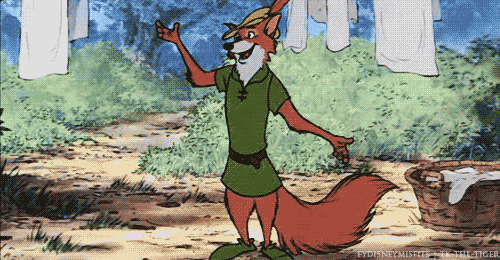
The Direct-to-Video Rebellion has a better premise and better ideas behind the script. It also had a really strong cast (Brian Blessed and Kristian Nairn are on the box cover, but neither are in the film for more than a few minutes). Like the wonderful Hammer films before it, it tries to focus on a single moment or mission in the Robin legend.

But then, it's just grim and joyless and devoid of substance as Zweihander. It's pretty sure it's got something important to say, but if that something was ever there, it got cut out in post.
2022
Finally, we get to this year with two direct-to-video entries: The Siege of Robin Hood and The Adventures of Maid Marian.
Marian isn't getting in competition from this guy, though.

You're probably looking at that cover, worried that you're going to judge the movie by the bad costumes and awful production design. Lots of RH movies I love have bad costumes and awful production design, though.
Paul Allica wrote, directed, and starred in this travesty, so all the blame goes to him. Before we get to the 20 minute mark, we've seen people clapping because a flamboyantly gay character got stabbed. Shortly after, we get a lot of racist bullshit about Asian Mercenaries being expensive but quiet and compliant. About 40-45 minutes in, we get the first fridging (but definitely not the last).
Don't worry though. There's still 70+ minutes left, all of it just as sexist and racist as before. (No more homophobia though: the one is dead.)
Allica and co have a background doing stunts and working as extras in martial arts films. Somehow, the fight scenes still suck. If Rebellion is like playing Zweihander with edgelords, Siege is like playing FATAL at a Q-Anon conference.

Filmed as the pandemic raged, the production faced a lot of challenges. The script might be weak and self-serious, but it makes up for some of it by keeping the action moving and the dialogue on point. Like some of my favorite Robin movies, there's no origin story here: Robin and Marian are on the run almost from the start. Marian is leaving Kirklees and Robin back from King Richard's endless wars, but they discover one-time Sheriff is hunting for them. Lead by Sophie-Louise Craig (with Dominic Andersen and Robin), this is a quick-moving take on Robin's encounters with the Prioress of Kirklees in the ballads, possibly the most interesting one since BBC's Legend of Robin Hood or Robin & Marian. (That's not the spoiler you probably think it is.)
#ttrpg#robin hood#sales#robin hood: prince of thieves#beyond sherwood forest#kevin costner#taron egerton#alan rickman
17 notes
·
View notes
Photo
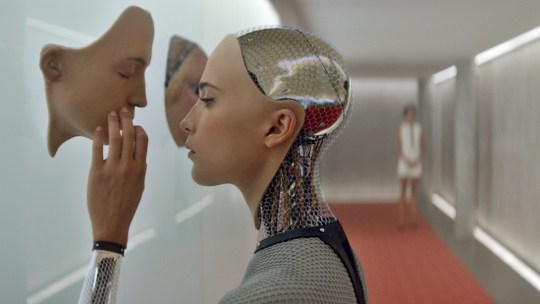
Alicia Vikander in Ex Machina (Alex Garland, 2015)
Cast: Domhnall Gleeson, Alicia Vikander, Oscar Isaac, Sonoya Mizuno, Corey Johnson, Claire Selby, Symara A. Templeman, Gana Bayarsaikhan, Tiffany Pisani, Elina Alminas. Screenplay: Alex Garland. Cinematography: Rob Hardy. Production design: Mark Digby. Film editing: Mark Day. Music: Geoff Barrow, Ben Salisbury.
Screenwriter Alex Garland's debut as director has a lot going for it: a tightly provocative and suspenseful Oscar-nominated screenplay (also by Garland), a superb trio of stars, and special effects that don't overwhelm the story. The effects won Oscars for Andrew Whitehurst, Paul Norris, Mark Williams Ardington, and Sara Bennett, overcoming competitors with far more flash and dazzle: Mad Max: Fury Road (George Miller), The Martian (Ridley Scott), The Revenant (Alejandro González Iñárritu), and Star Wars: Episode VII -- The Force Awakens (J.J. Abrams). For once, special effects were kept on the human scale, largely to present Ava (Alicia Vikander) as the ambiguous cross between human being and robot on which the screenplay's exploration of the ethics of artificial intelligence depends. Ava (whose name is a variant spelling of "Eve") is the creation of Nathan (Oscar Isaac), a superwealthy tech genius who made his fortune with an Internet search engine not named Google, which he uses as the software for his experiment. He lures a young coder, Caleb (Domhnall Gleeson), to his isolated retreat on the pretext that he wants Caleb to apply the Turing test on Ava. Nathan's unstated aims are far more extensive, and Caleb sees through them quickly. But neither of them is quite as quick on the uptake as Ava. Gleeson is convincingly geeky as Caleb, and Isaac, in yet another performance that establishes him as one of our most chameleonic actors, evokes the self-absorption and questionable ethics of any number of tech billionaires. But it's Vikander who steals the honors with Ava's sly mixture of naïveté and nascent cunning. The only thing I can fault Ex Machina for is a conventional sci-fi ending that feels out of keeping with the intelligent questioning of the middle part of the script and seems too much like a setup for a sequel.
3 notes
·
View notes
Text
Body Horror Beatdown, Match 18, Round 1
Vote for your favorite:
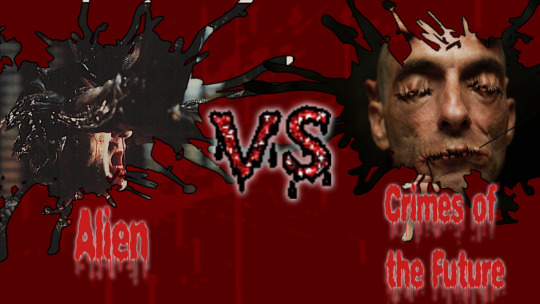
Propaganda under the cut.
Alien
In space, no one can hear you scream.
"Okay so, for starters it’s famous for one of the scariest body horror scenes in the history of film (also one of the earliest REALLY SCARY REALLY GORY ONES) where you see the xenomorph pop out of the guy’s chest, from then on things just get worse even if it’s a slower kind of dread, you get to see the alien in all of its glory and witness the murders of the crew members in sometimes gruesome sometimes off-screen up-to-the-imagination types of ways. I guess the freakiest part though is the idea that you can be inhabited by one of those creatures and there’s nothing you can do to stop it from literally tearing you apart from the inside out, unless you die"
Crimes of the Future
Surgery is the new sex.
"listen you KNOW cronenberg is the master of body horror shit and crimes of the future fucks so unbelievably hard. it's about surgery it's about sex it's about the sensuality of the flesh it's about our relationship to technology and the government. please vote the sexy surgery movie. for me"
#bodyhorrorbeatdown#body horror beatdown#gore#body horror#round 1#polls#alien#alien 1979#crimes of the future#crimes of the future 2022#ridley scott#david cronenberg
18 notes
·
View notes
Note
"This whole season is award bait but like unintentionally" "they don't need the awards but they deserve them" EXACTLY EXACTLY. They're just writing a fantastic show and acting their little hearts out and the end result is someone amazing some shows are like these baity award shows and it shows so hard like those movies specifically made to win oscars. The boys are doing their own thing no else is doing and they're killing it (another show in the deranged superhero genre that gets even less recognition than the boys is doom patrol and that show deserves so much praise but it is extremely underwatched and underrated).
Oh exactly, it's kind of like Ridley Scott's 'The Last Duel' or 'Gucci', where you know these were chosen to either win awards or capitalize on a popular brand, but neither making much of an impact due to the story not really being about anything that mattered to audiences. Meanwhile the Boys is out here having fun, not only LIFTING from headlines (the Imagine video was legit copied, even using the same song, easiest five pages of script I'm betting) but also combining actual issues (trauma, dealing with disabilities, descent into psychosis, addiction, feeling burnt out, etc.) combined with the MOST batshit scenarios (laser babies, human testing center for supes, HEROGASM). That's what audiences want!
And oh don't even get me STARTED on Doom Patrol. Such an amazing show - Larry is so Cas-coded it's amazing. I never thought about it though but it is apt to say Doom Patrol is the HBO Max's answer to the Boys (and how funny is it that both are run by writers from Supernatural... it's like the Flapjack Family tree where most of the amazing 2010 cartoons can trace their lineage back to the people who worked on the Marvelous Misadventures of Flapjack).
Anyway go watch Doom Patrol if you already haven't!
9 notes
·
View notes
Text
31 (Films) to Life: Thelma and Louise (1991) - Recap: Part One
Hey, Ridley. How’re things?
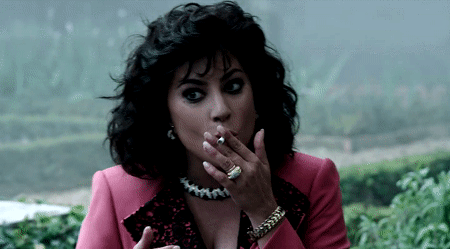
A bit mixed it seems. So, same old same old, huh? See, Ridley and I have had some run-ins before on this hellsite (see my Reviews of The Martian and Legend for more of that), but I’ve also seen quite a bit of his filmography, it turns out. Here’s a quick sum-up.
Alien (1979): A horror and science-fiction essential. If you haven’t seen Alien, you gotta get on that come October! It’s a classic! 92%.
Blade Runner (1982): Another science-fiction essential that you need to watch if you haven’t! Honestly, just watch that one right now if you want to. 94%.
Legend (1985): Check out my thoughts on this one, it’s...it’s a weirdy.
1492: Conquest of Paradise (1992): FUCK this movie. Listen to me, OK, LISTEN TO ME. Absolutely fuck this movie. It’s meant to be a celebration of Christopher Columbus, so it’s already a piece of shit premise, but then...the movie itself is a historically inaccurate, badly acted, poorly shot piece of absolute garbage. It’s so bad that I was going to write a review on it for this site, but never actually finished it. FUCK this movie, OK? 28%.
Gladiator (2000): Classic film that maybe didn’t deserve the Oscar it got for Best Film, but still an excellent movie regardless. One of Russell Crowe’s strongest. 86%.
Kingdom of Heaven (2005): Another dogshit film with historical inaccuracy out the goddamn wazoo, don’t even get me STARTED. Not as bad (I guess) as 1492, but still a really bad film. 34%.
Prometheus (2012): ...Meh. It’s a movie. 66%.
The Martian (2015): Check out my thoughts on this one, too. Great movie, though, seriously.

Combine that with the well-received The Last Duel and the not-as-well received House of Gucci, and you can probably see Scott’s weird record. He’s a very off-and-on director, and the quality of one of his films is kind of unpredictable. Also, he might be semi-racist, but that’s neither here nor there, to be honest with you. Some quick backstory, then!
Ridley Scott is an English director who grew up during World War II. Yeah, he is surprisingly old, having been born two years before the war even started. He grew up watching newsreels of the War, and reading science-fiction books. Yes, the young Scott was a tiny little wartime nerd, he was. Both he and his younger brother Tony became enamored with the world of cinema, and their journeys began. Enter Kubrick.

Like I said, kid was a nerd, and Kubrick’s opus 2001 cemented that in him and his brother. However, their cinematic journeys went in slightly different paths. They both started working for the BBC, then began their own company in 1968, which they and multiple members of their families have since directed and worked for to this day.
Soon after, Ridley began a love affair with historical drama with his directorial debut, The Duellists. He’d return to the genre year after year, decade after decade, but this was his first jump into it. It’s kind of forgotten nowadays, but it’s pretty critically acclaimed, apparently. Might check it out, one of these days. Would his next film garner a bit more attention?
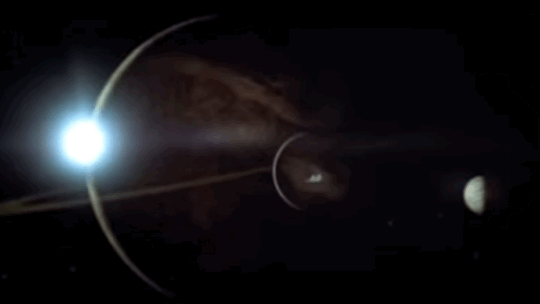
...Yes. Yes, it would.
Ridley’s in the money, now. Alien is a MASSIVE success, and he follows that up with fucking Blade Runner? Yeah, Ridley’s doing pretty good for himself at this point. And his brother? Well...
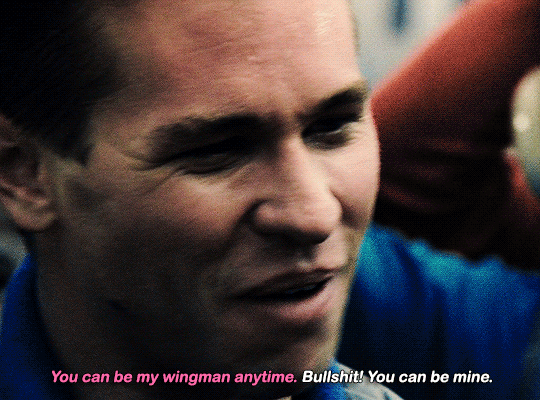
Fuck Maverick, that’s all I have to say about that.
But yeah, the Scotts are doing pretty good, come the 1980s! Ridley even gets in on the Tom Cruise action with Legend, funnily enough. The brothers are in the money, and they’ll stay that way for a while. But then...Ridley still has his missteps. There’s Legend, first of all, but then 1492 comes along in the ‘90s, and that’s...a fucking horrible movie. But again, Scott loves his historical epics, as we know. Speaking of historical epics...
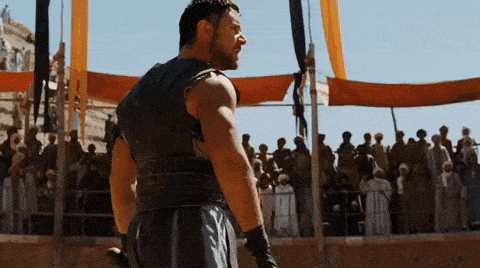
Aaaaaand, he’s back on top. Gladiator is another smash hit, and nets Scott his first Oscar win for Best Director. He’d been nominated before for Thelma and Louise, but hadn’t won yet. He also, uh...wouldn’t win again, as of yet. But more on that later, because Gladiator is doing awesome! Five Academy Awards, everybody’s entertained, Joaquin Phoenix dies. And then...

And we’re back down again. Hannibal...isn’t great. A sub-par sequel to Silence of the Lambs, the film does well commercially, but pretty poor critically. But hey, it’s Ridley Scott, he’ll recover with his next film, right?
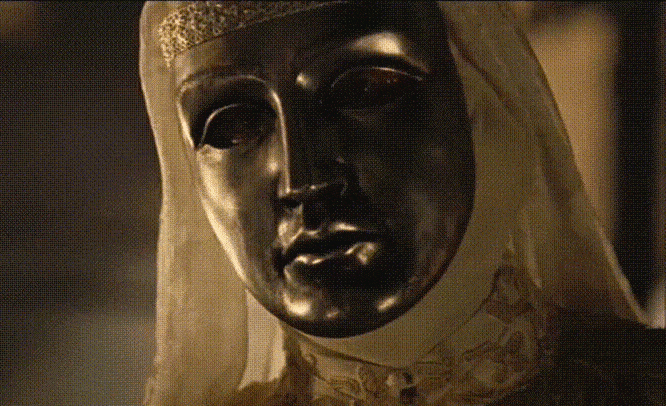
Oooooooooh, damn, that’s a bad misstep. Even for Ridley.
Yeah, Kingdom of Heaven is bad, Like, BAD bad. Riding off of the historical epic craze at the time, AND Orlando Bloom’s insane popularity at the time, this film severely faltered during a high point in Sir Ridley’s career. Oh, yeah, before this film? Dude was knighted for his service to the British Film Industry. Yeah, he was a HUGE deal. So, I’ll be referring to him as Sir Ridley Scott from now on.
Ridley starts to pick up the pieces again. He makes a biopic based on American history with the Frank Lucas biopic American Gangster, and that goes very well for him. Russell Crowe is in that one, alongside Denzel Washington as Lucas. Then, he takes a slight misstep with the spy thriller Body of Lies, starring Leo DiCaprio and Russell Crowe. And then, he makes a new and moderately received version of Robin Hood, starring...
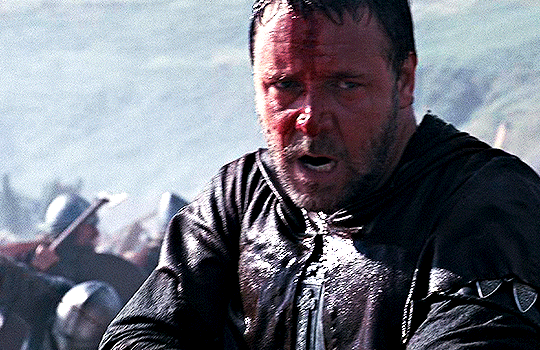
Some directors have their favorite actors, right? Scott’s favorite actor is Crowe. Anyway, he returns to the Alien franchise with Prometheus, which is...OK. Then, his brother Tony passes away, sadly, just as the two had started executively producing...The Good Wife? Huh. Go figure, but OK. And then...well, he makes a misstep of a different sort.
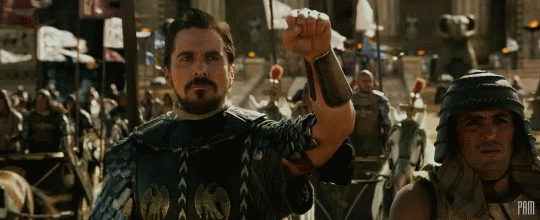
Now, at this point, I will understandably lose some of you. Because Scott directs Exodus: Gods and Kings, a story set in the time of Moses...in Egypt...and starring an almost entirely white cast. In Egypt. Including Moses, played by Christian Bale. And why, you ask? Because Scott said, and I quote:
I can't mount a film of this budget...and say that my lead actor is Mohammad so-and-so from such-and-such...I'm just not going to get financed.
Yikes. In case you didn’t catch that, he decided not to cast non-white actors for a movie starring Egyptian people...because it wouldn’t make any money for him. And it’s there that Ridley Scott might be a little racist. Because, yeah, it’s not necessarily an unreasonable comment in some ways, but...I dunno, take risks? You’re a goddamn filmmaker, that’s what you’re supposed to do? Yeah, not good. And neither was the movie, incidentally!
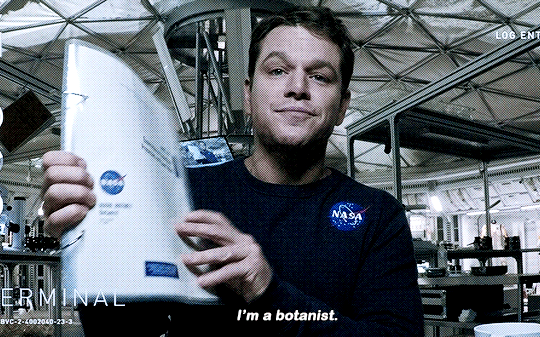
At this point, though, Sir Ridley Scott was moving on to The Martian, and that film was obviously excellent. But now, in the year 2022, his legacy is that of ups and downs, and he’s still going at the tender young age of 83. So, props there, I guess? Anyway, let’s look at one of the ups, huh?
Thelma and Louise is considered one of the greatest feminist films of the modern age by some, and is essentially...well, from the little I know about it, I know two things. One, “Sappho and her friend” energy is high with this one. And two, the ending is somewhat legendary, so...well, yeah, that’s sort of ruined for me...but when has that ever stopped me, right?
SPOILERS AHEAD!!!
Plot (by Callie Khouri)

Thelma (Geena Davis) is a housewife married to carpet salesman Darryl Dickinson (Christopher McDonald) who is ABSOLUTELY cheating on her. Like...it’s not even a little subtle. Dude is a verbally abusive dickhead to his sweet wife, and he tends to stay out late on Friday nights. Come on, Thelma, he’s cheating on you. Also, he’s played by Christopher McDonald, who I don’t think I’ve ever seen play a character who isn’t a dick.
Her best friend, Louise (Susan Sarandon) is a waitress at a local bumping diner. Together, the two are going on a fishing trip that weekend, while Darryl is away. And look, they’re best friends, and at least one of them is in an abusive relationship with her husband. There’s some energy there, I’m just saying. Oh, and before I forget to mention it, Thelma brings a gun along for protection. Which is fair, since this is the early ‘90s, and there are some unsafe people on the highways, men and...women...hmm. This reminds me of...something...

Well, anyway, the two gal-pals head off across the Arkansas countryside to this fishing cabin. They stop at a roadside trucker bar that evening, where Thelma immediately lets go of the housewife attitude and “lets her hair down”. This, of course, attracts the attention of Harlan (Timothy Carhart), a flirty stranger whose attention Thelma reciprocates and Louise spurns.
The party in the bar goes on, and Thelma gets a touch too drunk in the process. Harlan takes her outside for fresh air while Louise is in the bathroom. And yeah...the exact thing you expect to happen happens. Harlan makes the moves on her without her consent, and is about to rape her when Louise shows up, brandishing Thelma’s gun in the process. At gunpoint, Louise forces him to release Thelma, and Harlan takes that opportunity to talk back. Leading to...

Chekhov’s gun always fires.
This is a crime film, after all. Thelma and Louise are officially on the run, with Thelma wanting to go to the police, and Louise rightfully insisting that the odds of anyone believing them are low. And it’s also at this point that I realize what this movie is reminding me of...something. Man, this is gonna bug me.
While Thelma and Louise hang out in a diner, the cops arrive at the trucker bar to investigate Harlan’s murder. Head detective Hal Sloucomb (Harvey Keitel) interviews the waitress Lena (Lucinda Jenney), who served them both and points him away from the two women, insisting that they were not the type that would do this. Still, they decide to sic the FBI on the two missing women.

Thelma’s spiraling in panic, understandably, while Louise is...mostly calm and collected about this whole thing. The two have a mild argument, leading to Louise calling boyfriend Jimmy Lennox (Michael Madsen) to wire money to her in Oklahoma City. Her plan? Jet to Mexico, before the cops get on her tail. Thelma also calls Darryl, first at night when he isn’t home (and definitely cheating on her), and then the next day, when he doesn’t seem to care. He demands that she comes home, leading to her telling him to go fuck himself. Excellent.
As she comes out of the phone booth, she stumbles into...Brad Pitt? Huh. Apparently, this is J.D. (Brad Pitt), a handsome young man in cowboy attire, which just makes this seem more like Brokeback Mountain by the second. J.D. is attempting to get back to school, and asks the two girls for a lift. While Thelma seems open to the idea, Louise unsurprisingly refuses, and the two take off to Mexico, with Thelma officially along for the ride now. But they have to do so with the explicit goal out not going through Texas, Louise’s home state. Wonder why.

Hal continues his investigation of the two by talking to Darryl. On the road, as if guided by serendipity, the two encounter J.D. again, and agree to give him a ride to Oklahoma City, where Louise picks up they money order sent by Jimmy. And surprisingly enough...Jimmy himself is there to greet her. Louise turns him away, not wanting to drag him into this, and also displaying a continued disdain for the men that surround her. I mean, given this movie, that’s super understandable, but...you have to wonder, right? What happened in Texas?
Still, she does seem to genuinely care for Jimmy, and an angry and confused Jimmy seems to care for her...in a violent and mildly abusive way. By which I mean he throws a chair across the room, stops her from leaving, then gives her an engagement ring. Which, uh...mixed messages, bud, mixed messages. Meanwhile, J.D. returns to Thelma’s room for...well, come on, it’s Brad Pitt, and Thelma’s in a loveless abusive marriage. You know what’s about to happen.

Yup! He reveals to her that he’s a convicted thief on the run!
If you guessed, you get the prize of the encroaching dread at what’s probably gonna happen. J.D.’s an armed robber of many gas stations and convenience stores, currently skipping parole for his crimes. He and Thelma immediately have sex after this revelation, while Louise and Jimmy reminisce about their relationship. Louise does seem to love Jimmy, but refuses the proposal due to her present predicament.
Morning comes, and Louise and Jimmy part ways, with a hope to meet again one day soon. Thelma comes down post-coitus, and they realize that J.D.’s alone in the room...with the money. And he’s a thief. So, uh...yeah, it’s gone. And they’re officially fucked now. Now it’s Louise’s turn to break down while Thelma has the level head, apparently having an idea of what to do. In the meantime, Hal bugs Darryl’s phone with the help of Agent Max (Stephen Tobolowsky), hoping to get her location when she calls him. Also, I haven’t really said it yet, but...Darryl’s a piece of shit. I just had to put that on the record, because he is.

It is now at this point that we find out why Thelma was so calm about the lost money: she robbed a goddamn store. See, J.D. gave her some pretty clear instructions the night before, and Thelma remembered it all. Which means that, at this point, in the eyes of the law, they are both OFFICIALLY fucked. But hey...at least they have money now, amirite? And it’s here that their crime spree begins in earnest. And...OH WAIT! THAT’S what this reminds me of!

I’ll elaborate more...in Part Two! See you there.
#thelma and louise#f:thelma and louise#film:thelma and louise#1991#ridley scott#geena davis#susan sarandon#brad pitt#michael madsen#harvey keitel#christopher mcdonald#crime film#crime movie#31 to life#31 films to life#user365#365 days 365 movies#userzonez#onlyperioddramas#filmgifs#henricavyll
5 notes
·
View notes
Text
New Post has been published on Harold Gross: The 5a.m. Critic
New Post has been published on https://literaryends.com/hgblog/napoleon/
Napoleon
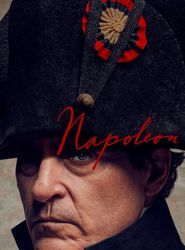
[2.75 stars]
At the very least, when you watch an historical biography or depiction of major events, you expect to learn something. Possibly about the characters, but definitely about the details of the events. Ridley Scott’s (House of Gucci) look back at late 1700s France and one of the most notorious figures in history provides neither in great amounts.
It’s big. It’s visual. But as a movie, it’s boring as heck. This isn’t so much a movie as it is historical highlights re-enacted (often poorly) for the fun of it. And that makes it the second worst movie nominated this year at the Oscars for me.
There is a mountain of wrong with this 2.5 hour epic. Let’s start with the irony that almost all of the French characters have English accents…when they were fighting and decrying the English though the entire film. It was a constant gravel-grind in the believability gears. And that Joaquin Phoenix (Joker) himself had no accent made it even worse. Yes, Napoleon was Corsican, not French, but it still didn’t sit well.
Phoenix is also too tall for the role, even given that Napoleon’s height was often misconstrued. The root of his titular pathology, Napoleon Complex, was more about his own sense of inferiority. But we never really get that. He climbs so quickly in the story and wins almost every conflict so easily that we never really understand his drive. He comes across as a compassionate general, sacrificing men only when necessary. Even on the deadly march to Russia that got him exiled his reasoning is unclear. Everything in the movie just happens. There is little lead up or emotional consequences, only events.
Ultimately, I think Scott’s intent was for this to come across as a love story between Napoleon and Vanessa Kirby’s (Mission: Impossible: Dead Reckoning Part One) Josephine. And to a small degree that works, but that short-changes Josephine’s life and place in the world. She had few choices.
I will grant that the battle at Austerlitz was astounding and managed to show us, for the one time in the entire film, what kind of brilliant tactician Napoleon was. But as the movie goes on, you just have to believe that the world felt threatened by him. By the time Waterloo and Wellington appear, his prowess is entirely hearsay from the movie’s point of view. You either know the history and accept the reactions or you don’t. The lack here is both script and the director’s acceptance of that situation.
If you want to spend the time with this one, it’s up to you. I can’t recommend it unless you are well versed in the history so you can unconsciously fill in the gaps. From a craft point of view, the performances are fine and the technical aspects of the film stunning. But as a story? Well, I’d have preferred my 2.5 hours back.
Where to watch

0 notes
Photo

Napoleon http://tinyurl.com/yosnvogv Ridley Scott does not meet his Waterloo in Napoleon, his headline-hopping spectacular about the man who conquered a huge chunk of Europe under the guise of a liberator. But nor is he covered in glory. This strange film has neither blockbus...
0 notes